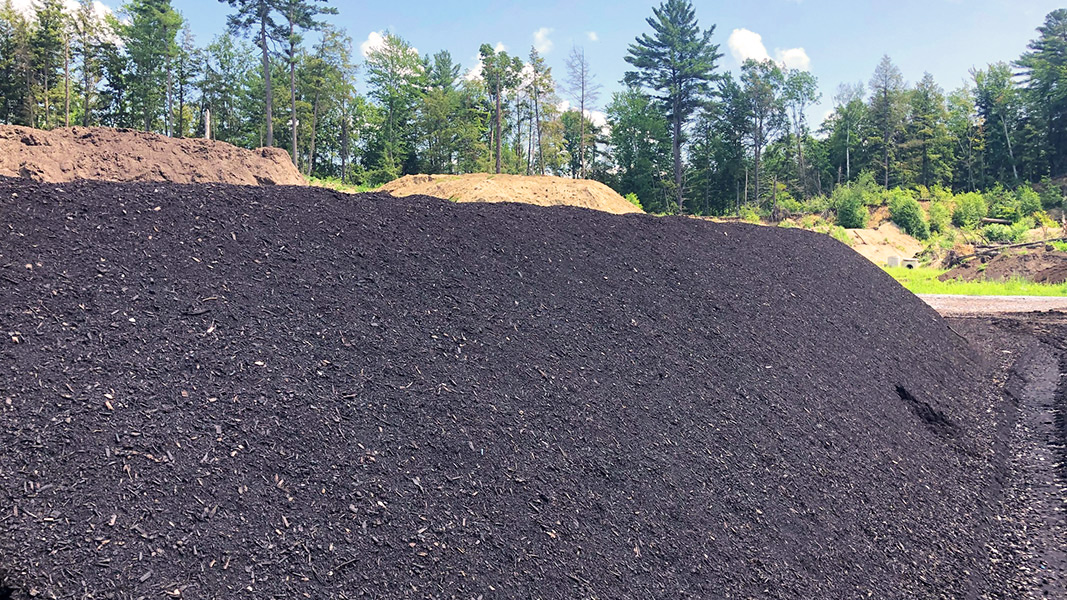Top: Composting facilities should consider coverage for risks that may arise from organic waste management.

Matthew Karmel
Even though many compost manufacturers and haulers believe they have adequate insurance, my discussions with numerous operators suggest most are still missing a key coverage: environmental insurance. Often, composters believe environmental risks are covered by their general liability policy, but that is unlikely. Instead, commercial general liability and other traditional policies typically contain broad exclusions for risks arising from pollution conditions, which in turn includes risks arising from organic wastes.
Runoff from a windrow impacting a nearby stream? Probably not covered under your general liability policy. Cleanup of food waste from a truck accident? Not covered either. Odor complaints from a neighbor? Nope. PFAS in groundwater from your operations? Definitely not.

Items such as runoff from an operation impacting a nearby stream or odor complaints from a site neighbor are likely not covered under a general liability policy. Photo by Doug Pinkerton
In order to attempt to cover these risks and others, composters should consider obtaining environmental insurance. While the cost of this insurance depends on site-specific factors (e.g., site history, nearby natural resources, housing) and can be high, the premiums have decreased as the environmental insurance market has matured. And not having the insurance is sometimes even more expensive. Large waste generators and investors also may require this insurance contractually, so it’s important to get this coverage in place to help your business grow.
Based on years working with composters through the US Composting Council and the New Jersey Composting Council, and my experience as an attorney negotiating environmental insurance policies, composters that want good environmental insurance coverage should keep in mind the following tips. These tips also apply to anaerobic digestion/biogas facilities and other waste and recycling businesses, although there are some differences.
Tip #1: Assemble an experienced insurance team.
Carefully consider whether your regular insurance broker has the expertise and connections to obtain environmental insurance coverage on your behalf. Environmental policies are often written on a manuscript basis, meaning the policy is written on a custom basis to include coverage or conditions not included in a standard policy. As a result, policyholders have an opportunity through negotiation to obtain the best policy possible to suit their needs, and it is important to work with an experienced broker and environmental attorney.
Tip #2: Pursue the right type of coverage.
There are several different types of environmental insurance, with distinct coverage profiles. These policies also are sometimes referred to by different names. For instance, one type of policy is referred to as pollution legal liability or “PLL” insurance, and is essentially the same as environmental impairment liability insurance or “EIL” insurance. This coverage primarily applies to activities conducted at specific locations and therefore is appropriate for addressing risks associated with composting facilities. Another type of coverage is contractor’s pollution liability insurance. This coverage primarily applies to activities of the insured, whether in connection with a specific project or more broadly, and therefore is appropriate for service providers in the composting industry. Additionally, within these policies, it is possible to obtain different coverages:
- Clean up costs for pollution occurring prior to the policy period (including historical contamination)
- Clean up costs for pollution occurring during the policy period (including operational discharges)
- Third-party claims alleging bodily injury or property damage arising out of pollution
- Pollution occurring during transportation to or from a covered site
- Business interruption expenses necessitated by cleanup activities
- Crisis management/PR expenses associated with a pollution incident
Composters should determine which coverages they need, as well as any hidden limitations or coverage gaps. If a particular type of coverage is not needed, premium costs can sometimes, but not always, be reduced by eliminating that coverage from the policy. Conversely, it is sometimes possible to expand coverage without significantly increasing the premium costs. However, coverage for operational discharges is a must for composting facilities; the rest is optional but valuable.
Some composters may want to forego coverage for historical contamination, and, in fact, coverage for preexisting conditions may not be offered unless specifically requested. Additionally, some composters may decide that it is not worthwhile to maintain business interruption and crisis management coverage, although these coverages can be particularly valuable given the sometimes vocal public opposition to composting facilities.
Tip #3: Meet (and standardize) contractual insurance requirements.
When considering insurance coverage types and amounts, composters should make sure the coverage matches contractual requirements. Composters are increasingly being required by contracts with large waste generators, investors, lenders, and others to maintain environmental insurance. For instance, a landlord leasing a site to a composting facility may include environmental insurance as a requirement in the lease agreement. A mortgage company also may require that a composter maintain environmental insurance to protect the lender’s interests.
These parties often also require that they be added as additional insured on the environmental insurance. If required, this is usually accomplished by a blanket endorsement to the environmental insurance policy and not by adding each entity individually as an additional insured. (It also is important to standardize insurance requirements across contracts, to the extent possible based on leverage, to make things easier and therefore less expensive for the composter. To do this, create a schedule of your insurance policies, including limits and other key terms, and attach it to contracts.)
Tip #4: Disclose all known environmental issues.
Many composters have at least some history of environmental issues or regulatory violations. Even if those issues or violations resulted from a misunderstanding of the composter’s operations, they need to be disclosed to the prospective insurers. Failure to disclose relevant information is likely to result in a denial of coverage if a claim arises. While the composter may be able to defend against the denial, it is better to avoid the dispute by disclosing all relevant information. Questions about whether to disclose certain information should be carefully discussed with your insurance team.
Tip #5: Compare policies and examine coverage gaps.
As noted, environmental insurance policies are somewhat bespoke and differ from insurer to insurer. As a result, composters should compare policies to identify the best coverage for the premium involved. They should also be aware of coverage gaps. These include:
- Property damage. Policies generally define “property damage” to include physical damage to property, and loss of use of property that has not been physically damaged. A potential coverage gap exists for claims of diminution in value of a neighboring property that is not itself contaminated, such as when impacted only by odors. While not certain, there may be an opportunity to at least narrow this potential coverage gap through negotiation of favorable language that broadens the definition of property damage.
- Material change in use. Policies also typically include an exclusion for damages resulting from a “material change in use.” In policies that define this term vaguely or broadly, a change in feedstocks such as the transition from yard trimmings to yard trimmings and food waste could be considered a material change in use that would preclude coverage for any claims arising after the change. Composters should therefore carefully (and broadly) define the use when negotiating a policy.
- Emerging contaminants/PFAS. Another important issue is coverage for emerging contaminants, such as per-fluorinated compounds, the most infamous of which is PFAS. Some policies contain a blanket exclusion for PFAS, while others provide coverage for this contaminant.
- Voluntary sampling. Lastly, many policies contain an exclusion for claims arising from pollution discovered through voluntary sampling. Given the amount of testing conducted by composters, the voluntary sampling language may need to be broadened to allow routine sampling such as to satisfy a third-party certification as well as any sampling that is conducted for a valid business reason and not merely to discover pollution.
While there are many other items to consider when obtaining environmental insurance, composters following these tips will be well suited to navigating the environmental insurance market. As the composting industry continues to grow and evolve, there will continue to be tension between composting facility operators and the public and even some environmental regulators. Composters with environmental insurance in place will be ready to deal with contingencies better so they can keep doing what they do best: making soil.
As chair of Offit Kurman’s Environmental and Sustainability Law Group, Matthew A. Karmel, Esq. represents a wide range of businesses, from startups to large private equity funds, and provides comprehensive legal assistance to composters and other members of the organics recycling industry. He also helped found the NJ Composting Council and its Advocacy and Market Development Committee.













